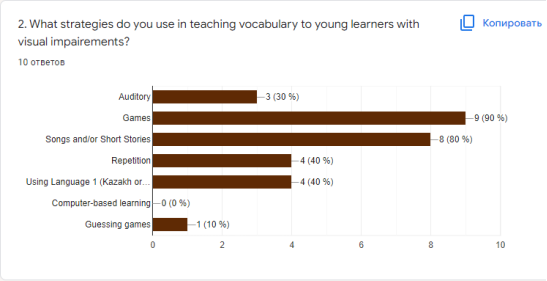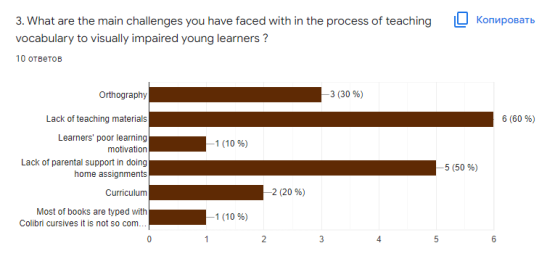The purpose of the study was to investigate how to teach vocabulary to visually-impaired young learners: the role of teaching vocabulary to students with visual limitations, what challenges students usually face with, its role in a foreign language acquisition, how it can be applied and promoted at secondary education level.
Keywords: vocabulary, English, visually-impaired, strategies, inclusive education.
Introduction
One of the five aspects (reading, writing, listening, speaking, grammar) of foreign language learning is vocabulary acquisition. There are some reasons why vocabulary needs to be taught. Firstly, as Amalia states, a limited vocabulary stock can cause stress and unconfidence among language learners. A wide range of vocabulary boosts students’ expressive skills. Secondly words are ‘starters’, they go first, before teaching spelling, pronunciation and grammar. Traditionally, young learners are best at memorizing new words [1]. They are tending to demonstrate specific qualities that help them in vocabulary development process. But they fail to learn on their own; they need supportive teachers which create a friendly environment, specifically within integrated education mode.
Vocabulary and Visually impaired young learners
Vocabulary learning has been intensively investigated with a good number of scholars in foreign language education [2, 3, 4, 5]. Scholars stress the significance of vocabulary development in the process of foreign language teaching to assist students to socialize in the target language [6]. Some or all of the language aspects may cause difficulties while master Language 2 vocabulary; it remains a controversial how students with visual impairments learn the new vocabulary in foreign language classrooms. Therefore, we have targeted to conduct a mini-research within a case-study.
Context, Methods, Data collection
English as a foreign language is known to be a core discipline at primary schooling. Normally, 2 hours per week for language classroom engagement is scheduled in the national curriculum. English teaching and learning is expected to be effective to support young learners of all levels and special needs. Students with visual limitations require a careful selection of teaching approaches and strategies.
A qualitative research method was used to explore English language teachers experience working with visually-impaired students and some students’ attitude towards developing vocabulary in the classroom and out of the classroom, shared individually. The online-survey respondents are current language teachers from special secondary schools for the blind and visually-impaired from Karaganda, Almaty, Shymkent, Semey, and Nur-Sultan regions. The survey was shared by sending the link to Google forms (https://forms.gle/Rh9N5DvEw534bf989).
Multiple sourced data was collected during the period January — March, 2022. Since the research site is the current workplace of the researcher, it makes it a convenient and accessible site for oral and written accounts, semi-structured interviews and a survey. These accounts provided a medium, to contextualize fellow workers’ experience and attitude and students' challenges in learning new vocabulary that will constitute and explain the role of teaching strategies chosen for a successful language classroom.
All the students (n=8, 71,4 % were boys and 28,6 % were girls) which were voluntarily interviewed are primary school children with visual impairments.
Data Analysis
Each participant of the online survey answered demographics related questions first. The demographic questions helped to reveal a total number of participants, their gender share, working experience as English language teachers and experts in the inclusive education. All the teachers (n=10, 2 male teachers and 8 female teachers) have been working in specialized local schools with different teaching experience. The majority are in their 30s. 60 % have been more than 5 years in this career. Only two respondents are new-comers with a year and less than 5 years of teaching experience. The data can be illustrated through the table below (See Table 1).
Table 1
Demographic data analysis
|
Demographics |
Classification |
n |
% |
|
Gender |
Male Female Prefer not to say |
2 8 — |
20 80 |
|
Age |
In their 20s In their 30s In their 40s |
2 6 2 |
20 60 20 |
|
General teaching experience |
A year 2–5 years 5–10 years 10–15 years 15 year and more |
1 1 3 2 3 |
10 10 30 20 30 |
|
Working experience with children with visual impairments |
A year 2–5 years 5–10 years 10–15 years 15 year and more |
1 3 3 — 3 |
10 30 30 0 30 |
The demographics questions were followed by the main three questions. The main questions included whether teaching vocabulary to young learners with visual impairments is important or not; what strategies they use in teaching vocabulary to young learners with visual impairments; what main challenges they faced with in the process of teaching vocabulary to visually impaired young learners.
Question 1 shows that 4/5 believe that teaching vocabulary is crucial in the process of language teaching to students with visual limitations. Only 0.20 chose the option «difficult to say».
Question 2 helps to elicit strategies for vocabulary development in the integrated language classroom. The most popular approaches are Games, Songs and/or Short Stories. The bar chart illustrates the variety of responses among the language experts where one can notice that there is no experience in using computer-assisted language activities (see Figure 1).

Fig. 1. Common strategies for vocabulary development
Question 3 shows what drawbacks teachers face with while teaching new English vocabulary. The answers varied; from a huge number of orthographical mistakes in students’ English language performances to the lack of a parental support (see Figure 2).
One of the language experts strongly believes that another big challenge in enriching students’ vocabulary is:
‘Most books are typed with Calibri cursives which it is not so comfortable for reading texts and exercises’.

Fig. 2. Common challenges teachers face in students’ vocabulary development
The interview was designed to analyze students’ personal reflections on:
— the most challenging aspect in learning new words;
— how they traditionally memorize;
— what vocabulary learning activity they enjoy most in English classroom;
— how helpful their parents whenever they struggle with their home assignments.
The analysis shows the minority memorize new vocabulary when teachers use auditory approach accompanied with visual illustrations; an equal share of them expressed some difficulties in learning by hearing, regular repetitions in the classroom, even after follow-up activities for reinforcing new English words. They need a constant assistance of their family members. ¼ of interviewees noted they make less spelling mistakes, while 75 % find it rather challenging. The majority enjoy the class when they are engaged in the learning process through interactive activities based on Total Physical Response, games, songs and video materials. All the students are provided with academic support out of the classroom, which contributes to their language performances. Generally, despite some drawbacks in learning English language vocabulary, the students feel positive about their personal experience and the approaches selected by their English teachers.
Findings and Conclusion
The current findings shed a light on the way language experts and students view the problem of English language vocabulary development.
Young learners demonstrate exceptional commitment to their educational goal when they are supported with many resources and parents while studying from home. Foreign language instructors should encourage learners to work not only with intensity but also with stamina. They should prepare students to accept misfortunes and empathize that excellence in any disciplines is a long-term task which requires perseverance.
References:
- Amalia D. (2019) Effective techniques in teaching vocabulary to young learners//https://www.researchgate.net/publication/332186677
- Arifah, S., & Auliya, P.K. (2021). Analysis of teachers’ perspective towards youtube as a learning tool to young learners’ vocabulary development on virtual learning. Journal Universitas Muhammadiyah Gresik Engineering, Social Science, and Health International Conference (UMGESHIC).
- Hariyono, T.C. (2020). Teaching vocabulary to young learner using video on youtube at english course.
- Barani, G., Mazandarani, O., & Seyyad-Rezaie, S. H. (2010).The effect of application of picture into picture audio-visual aids on vocabulary learning of Iranian EFL learners.Procedia, 2, 5362–5369.
- Başaran, S. (2012). Teaching English to visually impaired students in Turkey: A case study. Energy, Education, Science and Technology Part B: Social and Educational Studies, 2, 217–226.
- Carter, R., & McCarthy, M. (2013). Vocabulary and language teaching. London: Routledge







